Explore the 25 accredited Bachelor Degrees in Addiction Counseling Online. Compare degree programs, schools, careers, and salaries.
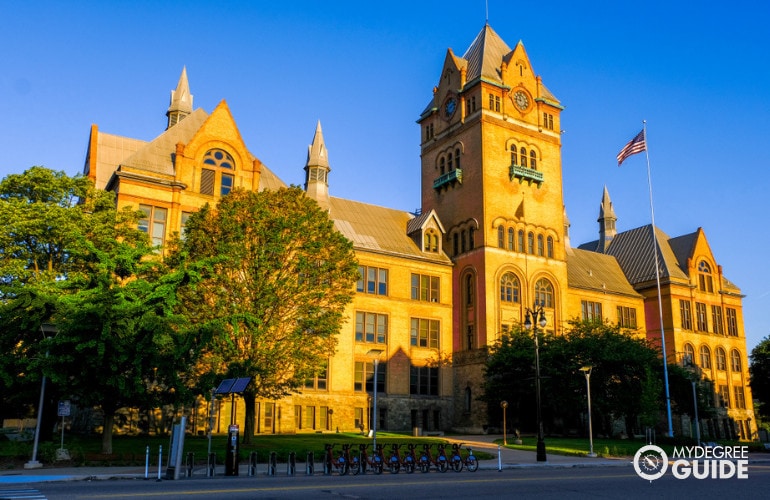
Addictive behaviors can be crippling. Addiction counselors know the destructiveness of these habits, but they also understand how to help. With the right education, you, too, may become an addiction counselor.
Editorial Listing ShortCode:
An online bachelor’s degree is the first step in earning the education that your state requires for addiction counselors. Some fields do require a minimum of a master’s degree, so compare programs to see which ones best match your goals.
If you’re ready to make a difference as soon as possible, an online bachelor’s in addiction counseling can help you get started.
Online Addiction Counseling Bachelor Degrees
While there is some overlap between these degrees, you’ll want to choose the concentration that best fits the type of position you want to have when you graduate.
Click on the degree that interests you most to jump to that section of the guide:
- Bachelor’s of Applied Behavioral Science
- Bachelor’s in Human Services
- Bachelor’s in Psychology – Addictions & Recovery
- Bachelor’s in Psychology – Clinical & Counseling Psychology
Some of these fields may require licensing and a master’s degree before you can begin work as a counselor.
Bachelor’s of Applied Behavioral Science

Studying applied behavioral science can help equip you with skills to help people swap their addictive behaviors for healthier ones. Applied behavioral science specialists may work in group or one-on-one settings where they guide people toward positive choices.
The degree program will include several psychology classes, such as Social Psychology and Statistics in Psychology. Courses specific to the behavioral science department may include Analyzing Behavior, Economics and Behavior, and Group Behavior.
Editorial Listing ShortCode:
You’ll also study human development, aging, professional ethics, and communication. Earning a bachelor’s degree in this field can help prepare you to enter the job market as an assistant applied behavioral science specialist; for advancement, you may want to pursue graduate studies.
Your bachelor’s degree may also qualify you to be a case manager, a residential counselor, a family liaison, or a youth program director. If you want to take your studies to the next level, you may also earn a master’s in applied behavior analysis online or on campus.
Bachelor’s in Human Services

People with addictions may rely on the assistance of government or community agencies. Those organizations depend on human services professionals who can work with their clients and provide administrative leadership.
As with many degree programs that apply to addiction counseling, you can expect to take a few psychology classes as part of your studies. These may include Abnormal Psychology and Developmental Psychology.
You’ll also study program implementation, case management, disability services, and multiculturalism. The curriculum may include Social Welfare, Public Policy, Client Assessment, Addiction Rehabilitation, and Social Behavior.
Editorial Listing ShortCode:
You may need to complete a practicum course in which you’ll gain experience in a local human services setting.
After graduation, you might look for an entry-level addiction counseling job, or you may become a caseworker, a program manager, or a youth services specialist. You may work in a non-profit agency, a correctional facility, a group home, or a medical clinic.
Bachelor’s in Psychology – Addictions & Recovery
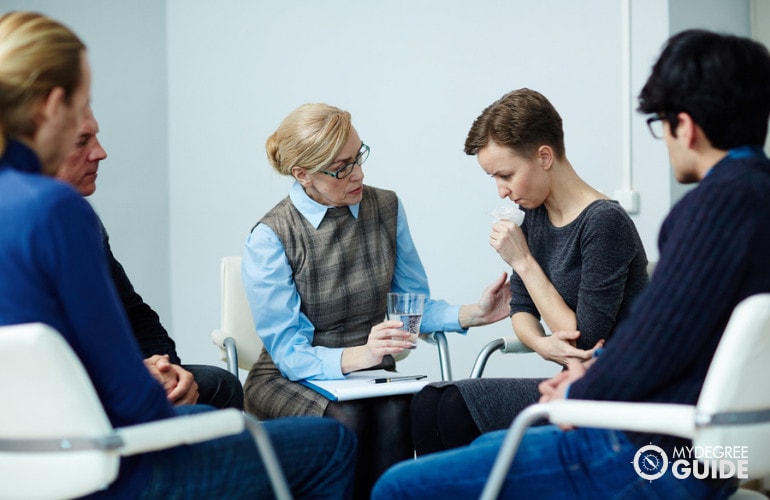
Studying for a bachelor’s degree in psychology can help you learn about the many domains of this field. You may study cognitive psychology, developmental psychology, and social psychology, for example.
Your understanding of these many perspectives on the field can help you develop a comprehensive view of how people think and behave, and you may have many opportunities in your career as an addiction counselor to draw on that knowledge.
Editorial Listing ShortCode:
During your bachelor’s studies in psychology, you may take core classes like Personality Theory, Abnormal Psychology, and Psychological Inquiry. For a concentration in Addictions and Recovery, you’ll also take field-specific courses that may help you apply psychological principles to drug and alcohol treatment.
These classes may include Addiction Recovery, Case Management, and Principles of Behavior Modification. After graduating with your addiction counseling degree, you might become an addiction counselor in a supervised setting or provide client support in a community program or a group home.
Bachelor’s in Psychology – Clinical & Counseling Psychology

Becoming a licensed psychologist requires earning a doctorate, and your bachelor’s degree may be the first step toward that goal. To start preparing you for a future career as a psychologist, your degree program will focus on core psychology classes.
Psychology is a scientific discipline, so, in addition to Introduction to Psychology and Human Lifespan Development, you should expect your undergraduate program to include classes in research and statistics.
For your Clinical and Counseling Psychology concentration, you’ll learn about working with individuals and groups. Concentration-specific classes may include Counseling Processes and Psychological Assessments.
Editorial Listing ShortCode:
Many psychology graduate programs encourage students to work one-on-one with counseling professionals during an internship. After graduation, you may be able to get an entry-level addiction counseling job, but many students use this as a stepping stone toward a psychology master’s program.
If you want to take your studies even farther, you may go on to earn your PhD in Counseling or pursue a Doctor of Psychology (PsyD) online or on campus.
Online Courses for a Bachelor’s in Addiction Counseling

Earning a bachelor’s degree requires you to take a variety of general education courses in math, language, science, and other disciplines so that you’ll be a well-rounded student. Your bachelor’s curriculum will also include many classes that are specific to your area of study.
Your online addiction counseling bachelor’s courses may include:
- Diversity in Counseling: Discuss how multicultural settings can influence counseling approaches.
- Ethics in Substance Abuse Treatment: Gain an appreciation for the professional ethics that should guide your practice.
- Family Dynamics in Addiction Treatment: Think about ways that family relationships can help or hinder the treatment process.
- Introduction to Counseling: Learn about different theories used in counseling practices and discuss how to apply them in various scenarios.
- Psychopharmacology: After this class, you’ll have a better understanding of the medications that are used in mental health and addiction treatment.
- Relapse Prevention: This course will give you strategies for helping people stay clean after treatment.
- Youth Addiction: You’ll learn about ways to reach children and teens for prevention and treatment.
Some programs include components in which you may gain professional experience. If so, you may need to enroll in an internship course for one or more semesters.
Addiction Counselor Careers

Helping people who have addictions comes in many forms. As a professional, you may work with youths, adults, people with mental health disorders, or people with developmental disabilities.
Your work may take you to hospitals, medical clinics, residential facilities, schools, community organizations, or correctional facilities. You might specialize in certain types of addiction treatment, such as gambling, narcotics, or alcohol.
Additionally, there’s a wide range of job titles for people in this field. As you work toward your bachelor’s degree, you may get a better idea of what you’d like to do after graduation.
Addiction Counselor

With a bachelor’s degree, your state may allow you to provide counseling services under the supervision of a licensed counselor. You may work in individual or group settings.
Human Services Assistant
You may be a case manager or facilitate programs in a social services setting. As an assistant, you’d work under the guidance of a supervisor.
Probation Officer
Drug offenses may require people to undergo a period of probation with regular check-ins with a probation officer. In this role, you may discuss making healthy, drug-free decisions.
Rehabilitation Counselor

In a group home, you might help people get back on their feet after addiction treatment. You may help people become contributing community members who hold jobs and interact appropriately with others.
Substance Abuse Social Worker
As a social worker, you might oversee client cases, assess progress, and maintain communication with family members. With supervision, you might provide some counseling services.
After completing your bachelor’s degree, you have the option of earning a Master of Social Work (MSW) online or on campus. There are also a few accelerated online social work degrees available.
Addiction Counselor Salaries
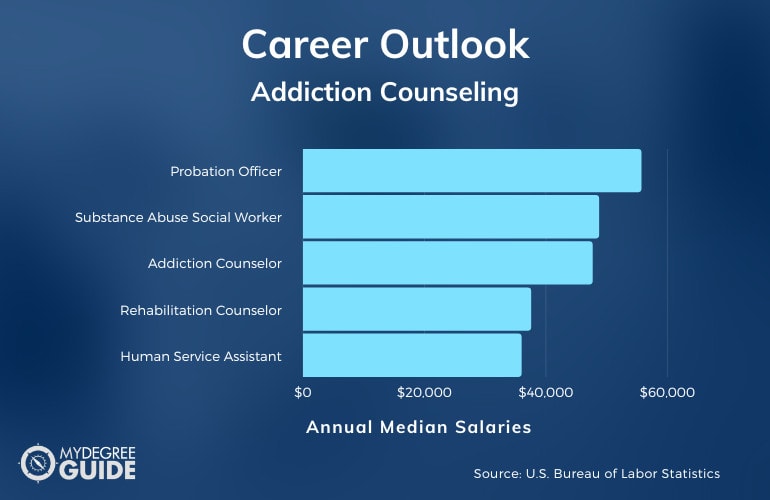
You may have a short job search after graduation. The U.S. Bureau of Labor Statistics expects the number of addiction counselors careers to increase over the next decade.
To help you get an idea of potential salaries, consider the annual averages for these positions:
| Careers | Annual Median Salary |
| Probation Officer | $55,690 |
| Substance Abuse Social Worker | $48,720 |
| Addiction Counselor | $47,660 |
| Rehabilitation Counselor | $37,530 |
| Human Service Assistant | $35,960 |
You should expect your salary to start near the lower end. You may move up with increased education and experience.
Certifications for Addiction Counseling

Although your state may require a master’s degree in addiction counseling (or a related field) for licensure as an addiction counselor, you may be able to obtain various industry certifications after earning your bachelor’s degree.
Certifications to consider include:
- Certified Addiction Specialist (CAS) from the American Academy of Health Care Providers in the Addictive Disorders
- Certified Substance Abuse Practitioner (CSAP) from the American Institute of Health Care Professionals (AIHCP)
- National Certified Addiction Counselor, Levels I and II (NCAC I and NCAC II) from the National Certification Commission for Addiction Professionals (NCC AP)
- National Certified Adolescent Addiction Counselor (NCAAC) from NCC AP
- Sexual Recovery Coach (SRC) from the American Association for Sex Addiction Therapy (AASAT)
Receiving these certifications may require meeting educational requirements, gaining professional experience, and taking exams.
Professional Associations for Addiction Counselors

It’s important for substance abuse counselors to stay up on the latest research and developments in the field.
Through membership in professional organizations, you may have opportunities to network with others, read informative articles, enroll in training sessions, and participate in industry conferences.
Organizations for addiction counselors include:
- Addiction Technology Transfer Center Network: These regional centers operate under the guidance of the Substance Abuse and Mental Health Services Administration.
- American Counseling Association: In this organization, you can learn from fellow addiction counselors as well as counselors from other disciplines.
- American Mental Health Counselors Association: This group is for clinical mental health counselors, such as Licensed Professional Counselors.
- International Association of Addictions and Offender Counselors: Membership in this group can be a good fit for those who work as probation officers and correctional treatment specialists.
- NAADAC, The Association for Addiction Professionals: This organization focuses primarily on chemical dependency and operates the National Certification Commission for Addiction Professionals.
- Society of Addiction Psychology: A division of the American Psychological Association, this group addresses chemical dependency and other addictions.
You don’t have to wait until you are working full-time to join these groups. Professional organizations usually accept student members and may offer discounted rates.
Accreditation
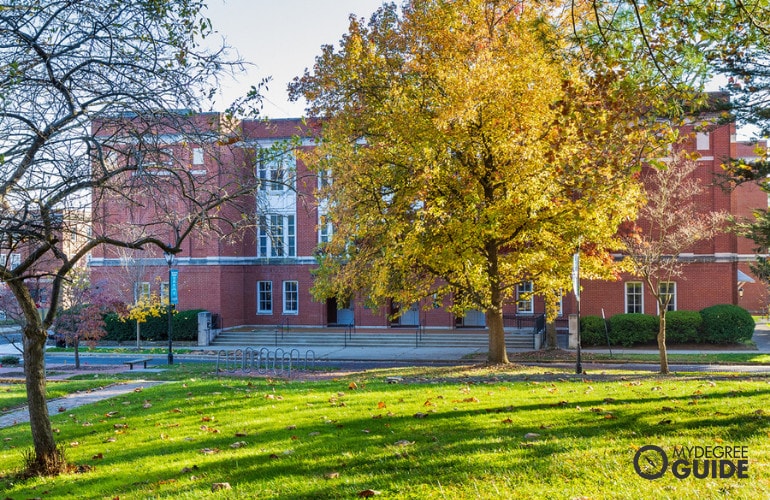
When entering an undergraduate program for addiction counseling, the main type of accreditation to consider is regional accreditation.
Your university should be approved by one of the country’s regional accreditors. The Council for Higher Education Accreditation grants those organizations the power to determine whether colleges meet the approved standards for delivering high-quality academics and student experiences.
Some addiction counseling programs receive programmatic accreditation from national counseling or psychology organizations, but that’s only at the graduate level. For a bachelor’s degree, you don’t need to factor programmatic accreditation into your school-selection process.
Financial Aid

Besides the federal government, there are plenty of financial aid opportunities available to someone studying addiction counseling.
Check your state, private organizations looking to make donations in the form of grants and scholarships, and your current employer. Your university may also offer a number of scholarships that you qualify for based on your high school GPA or area of interest.
Taking advantage of these sources of funding can help you focus on your studies and graduate into the working world sooner.
Why Get a Bachelor’s Degree in Addiction Counseling?

Earning your bachelor’s degree in addiction counseling may help you find a job soon after graduation. As the demand for addiction professionals increases, the skills you learned during your undergrad program may be desired by many employers.
The exact title you can hold will depend on your state, but you may be able to provide counseling services in supervised capacities. Other options might include case management or social work.
Your bachelor’s in addiction counseling can also help prepare you for grad school. With this foundation, you may be able to earn your degree in less time than someone new to the field.
Once you earn a master’s, you will likely have even more job opportunities available to you, and you may become licensed for independent practice.
How Do You Get a Degree in Addiction Counseling?

In some states, you need only a bachelor’s degree to begin working as a substance abuse counselor. Your bachelor’s degree may be in psychology, human services, social work, counseling, or applied behavioral science.
How Long Does It Take to Become an Addiction Counselor?
To get your bachelor’s degree, you’ll probably need to earn 120 credit hours, which usually takes about four years. Some people do it in as little as two years with a fast bachelor’s degree, and others need five or more years.
Pursuing a master’s degree may add another two years to your schooling.
How Much Do Addiction Counselors Make?

Addiction counselors can earn up to about $78,700 each year. According to the Bureau of Labor Statistics, substance abuse counselors in outpatient care settings earn an average of $45,960 annually.
Universities Offering Bachelor’s Degree in Addiction Counseling Online Degree Programs
Methodology: The following school list is in alphabetical order. To be included, a college or university must be regionally accredited and offer degree programs online or in a hybrid format.
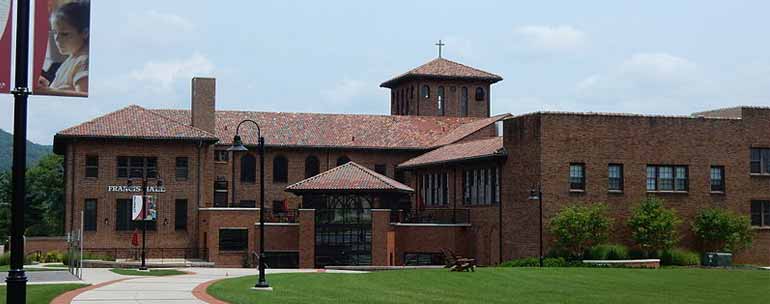
Alvernia is a private Franciscan Roman Catholic university established by the Bernardine Sisters of the Third Order of St. Francis. It was a college at first, founded in 1958. It wasn’t until 2008 that the institution gained university status.
Located in Reading, Pennsylvania, this campus has around 2,900 students among undergraduates, continuing education, and graduate students. The Alvernia Golden Wolves’ teams compete at the NCAA Division III level in the Middle Atlantic Conferences and the Eastern College Athletic Conference with eight men and 10 women varsity sports teams.
- Bachelor’s in Addictions and Mental Health Treatment
Alvernia University is accredited by the Middle States Commission on Higher Education.

Bluefield College is a private Baptist liberal arts college located in Bluefield, Virginia. Established in 1922, this college currently has 900 students enrolled and a campus located on 82 acres in Bluefield. On the other hand, and on its northern side, there is the East River Mountain.
Bluefield´s athletes, nicknamed the Rams, compete in the Mid-South Conference in football. For the remaining 13 sports the school offers, they compete in the Appalachian Athletic Conference.
- Bachelor’s in Human Services – Substance Abuse Counseling
Bluefield College is accredited by the Southern Association of Colleges and Schools Commission on Colleges.
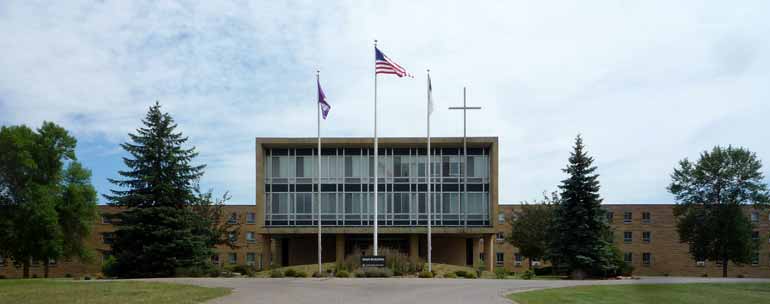
Crown College is a private Christian college headquartered in St. Bonifacius, Minneapolis. This institution was established in 1916. Nowadays, it has 1320 students enrolled and 81 members of the academic staff. It is affiliated with the Christian and Missionary Alliance and has on-campus and online programs.
Crown College’s sports team is nicknamed “Storm,” and they compete in the Upper Midwest Athletic Conference. Their stadium, The KleinBank Stadium, is a $2.4-million stadium, with approximately 1,400 seats.
- Bachelor’s in Alcohol and Drug Counseling
Crown College is accredited by the Higher Learning Commission.
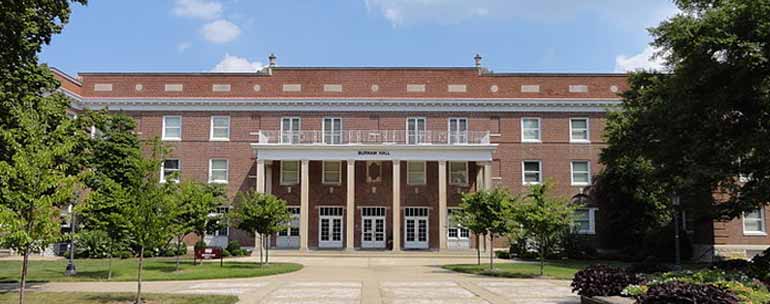
Eastern Kentucky University is a public institution based in Richmond, Kentucky. EKU was founded in 1874 and currently has an enrollment of more than 15,000 students. This institute also offers among 40 online undergraduate and graduate options, making things easier for older and working students.
Its athletes are known as the Eastern Colonels and compete in the NCAA Division I in the Ohio Valley Conference.
- Bachelor’s in Psychology – Substance Abuse
Eastern Kentucky University is accredited by the Commission of Colleges of the Southern Association of Colleges and Schools Commission on Colleges.

GCU is an Evangelical Christian University in Phoenix, Arizona. Established in 1949 by the Arizona Southern Baptist Convention in Prescott, this university is considered one of the largest Christian universities in the world. It has approximately 20,000 students attending on-campus and 70,000 students attending online.
Grand Canyon University is currently a member of the NCAA Division I. In most sports, they participate in the Western Athletic Conference. Its athletes are called Lopes, and they have a mascot in Thunder the Antelope.
- Bachelor’s in Counseling – Addiction, Chemical Dependency, and Substance Abuse
GCU is regionally accredited by the Higher Learning Commission.
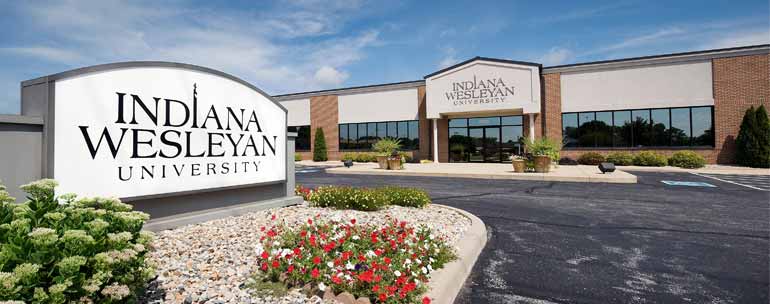
Indiana Wesleyan University is a private Christian university established in 1920. It’s located in Marion, Indiana and is the largest private institution in the state. This university is affiliated with the Wesleyan Church. Its mascot is called Wesley the Wildcat. The Wildcats play 18 varsity teams as a National Association of Intercollegiate Athletics’ (NAIA) member competing in the Crossroads League.
- Bachelor’s in Addictions Counseling
IWU is accredited by The Higher Learning Commission and is a member of the North Central Association of Colleges and Schools.
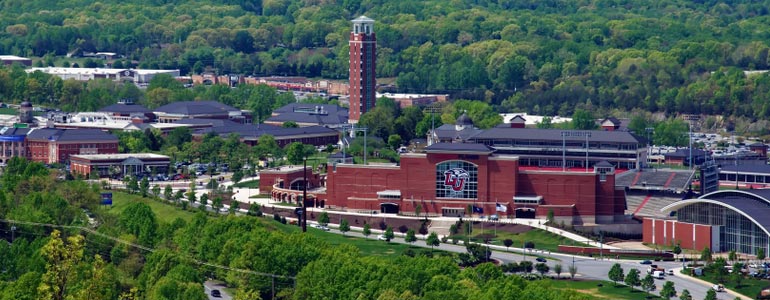
Liberty University is a private evangelical Christian university headquartered in Lynchburg, Virginia. This school was founded in 1971. Nowadays, it’s recognized as one of the largest private non-profit universities in the United States. Its enrollment has reached around 100,000 students in total.
Liberty athletes, who are called the Liberty Flames and Lady Flames, compete in Division I of the NCAA. Their mascot is Sparky the Eagle.
- Bachelor’s in Psychology – Addictions and Recovery
Liberty is accredited by the Southern Association of Colleges and Schools Commission on Colleges.
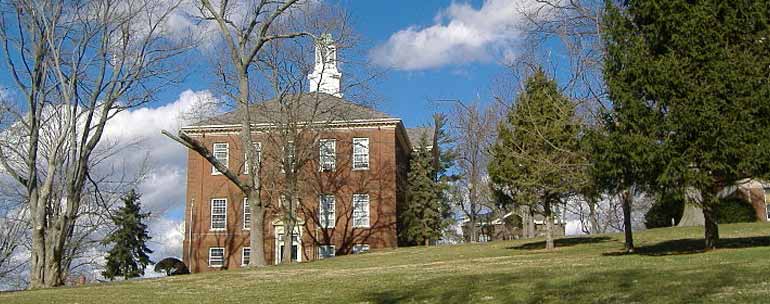
Midway University is a private Christian liberal arts university located in Midway, Kentucky. Related by covenant to the Christian Church, it enrolls approximately 1,600 students, who can earn 2-year and 4-year degrees as well as master’s degrees.
Midway was the only women’s college in Kentucky until 2016. This institution was established in 1847. Women’s sports include archery, basketball, cross-country, equestrian, soccer, softball, track & field, and volleyball. Men’s sports include baseball, basketball, cross-country, golf, soccer, and tennis.
- Bachelor’s in Psychology – Alcohol and Drug Counseling
Midway University is accredited by the Southern Association of Colleges and Schools Commission on Colleges.
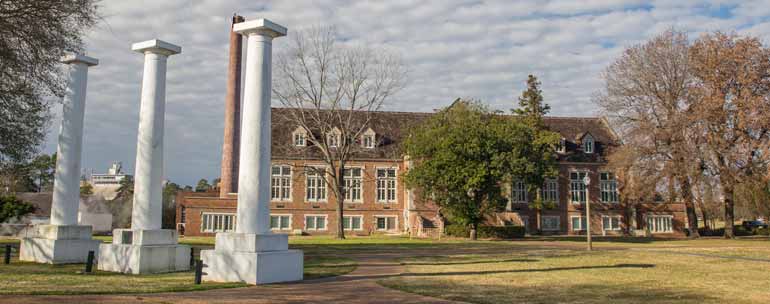
Northwestern State University of Louisiana (NSU) is a public university established in 1884 and now included in the University of Louisiana system. Its main campus is located in Natchitoches, Louisiana, with a nursing campus in Shreveport and general campuses in Leesville/Fort Polk and Alexandria.
Northwestern State athletic teams are called Demons, with women’s athletic teams generally called the Lady Demons. The university competes in the Southland Conference at the NCAA Division I level.
- Bachelor’s in Addiction Studies
Northwestern State University is accredited by the Southern Association of Colleges and Schools Commission on Colleges.
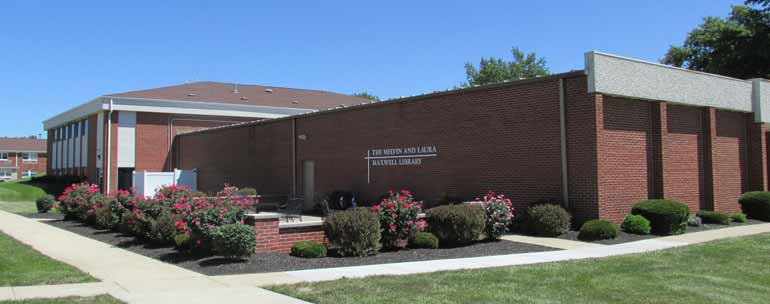
Ohio Christian University (OCU) is a private Christian college in Circleville, Ohio established in 1947. The denomination of the university is the Churches of Christ in Christian Union. Fittingly, it was first founded as Mount of Praise Bible College.
Athletically, Ohio Christian was accepted by the National Association of Intercollegiate Athletics (NAIA) recently, only five years ago. The athletic program has been a member of the River States Conference since that time.
- Bachelor’s in Substance Abuse Counseling
Ohio Christian University is accredited by the Higher Learning Commission of the North Central Association of Colleges and Schools.
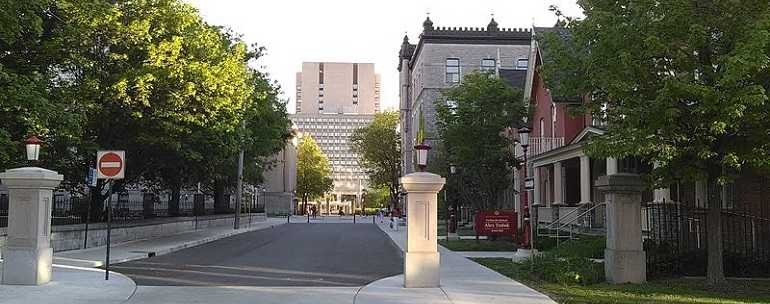
The University of Ottawa, as is often referred to, is a bilingual public research university in Ottawa, Ontario, Canada. The main campus is located on 42.5 hectares (105 acres) in the heart of Ottawa’s Downtown Core. It’s adjacent to the residential neighborhood of Sandy Hill, next to Ottawa´s Rideau Canal.
The university was first established in 1848. The school is co-educational and enrolls over 35,000 undergraduate and over 6,000 postgraduate students. The school also has approximately 7,000 international students from 150 countries, accounting for 17% of the student population.
- Bachelor’s in Addiction Counseling
Ottawa University is accredited by The Higher Learning Commission.
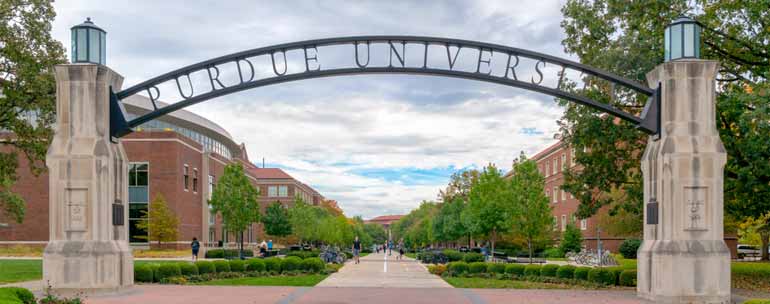
Purdue University Global (PG) is an adult-serving public university, operated as a part of the Purdue University System. The online campus was recently established in April 2018.
With content delivered mostly online, Purdue University Global programs focus on career-oriented fields of study at the associate´s, bachelor´s, master´s, and doctoral levels. The university also has eight physical classroom locations and an online law school.
PG’s academic headquarters are in Chicago; its main campus is in Indianapolis, and its online support centers are in Chicago and Fort Lauderdale.
- Bachelor’s in Psychology – Addictions
Purdue University Global is accredited by The Higher Learning Commission.
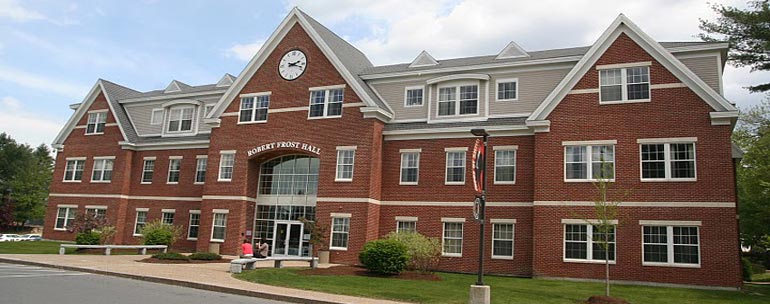
Southern New Hampshire University (SNHU) is a private university located between Massachusetts and Hooksett, New Hampshire. This institution was established in 1932.
Its background in sports is well-known. SNHU is a recipient of the NCAA Foundation Academic Achievement Award, which recognizes high graduation rates among student-athletes. SNHU took home the award for the highest graduation rate among all Division II institutions. SNHU also earned the Northeast-10 Conference Academic Achievement Award after the 2001–02 school year.
- Bachelor’s in Human Services – Substance Abuse
Southern New Hampshire University is accredited by the New England Commission of Higher Education.

This institution combines arts, sports, and sciences in undergraduate and graduate degrees. Interestingly, it’s known as the birthplace of basketball. A Canadian-American graduate student, James Naismith, invented the sport there in 1891.
Also, they are recognized by their Theater Production “The Illusion,” which is a comedy by Pierre Corneille and freely adapted by Tony Kushner, both of whom are alumni of the institute.
- Bachelor’s in Human Services – Substance Use Disorder Counseling
Springfield College is accredited by the New England Commission of Higher Education.

Part of the State University of New York (SUNY) system, Empire State College is a public college in Saratoga Springs with an annual enrollment topping 10,000. A variety of bachelor’s and master’s degrees are available through the school’s flexible, innovative learning paths designed for traditional, independent, and virtual learning. SUNY Empire was founded in 1971.
- BS in Addiction Studies
SUNY Empire State College is accredited by the Middle States Commission on Higher Education.

The Chicago School of Professional Psychology offers an online program for a BA in Psychology with a minor in Addiction Studies. Coursework includes Alcohol and Other Drugs in Our Society: Introduction to Chemical Dependency, Neuropsychology for Addiction Studies, and more. The program also includes a supervised field experience.
- BA in Psychology – Addiction Studies
The Chicago School of Professional Psychology is accredited by the Western Association of Schools and Colleges Senior College and University Commission.
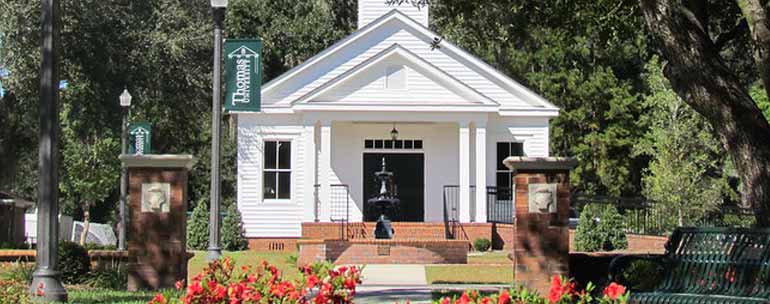
Founded on Birdwood Plantation, the Primitive Baptist Church established a junior college here in 1949. It became a private community college in 1976 when the PBC denomination released the 29-acre campus.
There are currently around 1,200 students on campus and online and have recently added a new academic building and opened a separate property approximately a mile away from the main campus. The Nighthawks play in the NAIA conference.
- Bachelor’s in Rehabilitation Studies – Addictions
Thomas University is accredited by the Southern Association of Colleges and Schools Commission on Colleges.
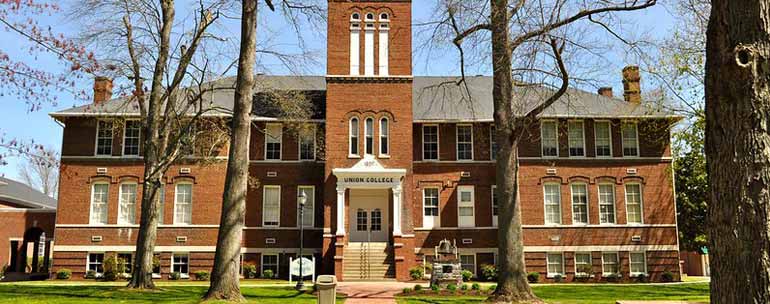
Union College is a private institution that was founded in 1795. This college offers accelerated professional degree programs in conjunction with other schools. Among many other options, students can graduate with a law degree from Albany Law School in six years or with a medical degree from Albany Medical College in eight years.
It has a total undergraduate enrollment of 2,206. The college is located in the city, and the campus size is 100 acres. It uses a trimester-based academic calendar.
- Bachelor’s in Substance Abuse Counseling
Union College is accredited by the Southern Association of Colleges and Schools, Commission on Colleges.
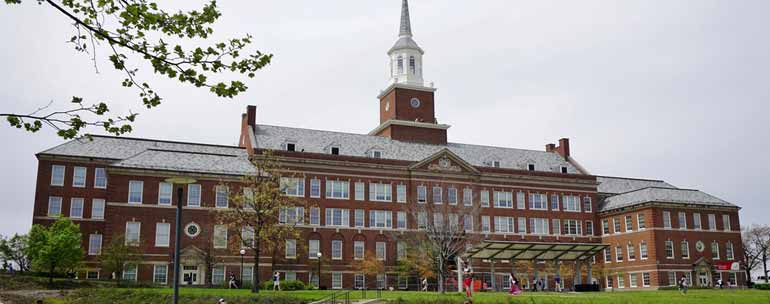
The University of Cincinnati is a public research university in Cincinnati, Ohio. Founded in 1819 as Cincinnati College, it is the oldest higher education institution in the city. It has an annual enrollment of over 44,000 students, making it the second-largest university in Ohio. It’s part of the University System of Ohio.
Since July 1, 2013, they have been members of the American Athletic Conference. Previously, they had been members of different athletic conferences in the United States.
- Bachelor’s in Substance Abuse Counseling
The University of Cincinnati is accredited by the Higher Learning Commission.

The University of Holy Cross (UOHC) is a private Marianite liberal arts college in New Orleans, Louisiana. The Marianites of Holy Cross founded this institution in 1916 as a 2-year women’s normal school.
Its original location was in the Bywater area of New Orleans. It is ranked among the top 100 institutions among the Regional Universities South by U.S. News & World Report. These schools are ranked according to their performance across a set of widely accepted indicators of excellence. This makes it a very attractive option for many students.
- Bachelor’s in Addiction Counseling
The University of Holy Cross is regionally accredited by the Southern Association of Colleges and Schools Commission on Colleges.

The University of Maine at Augusta (UMA) is located in the state capital of Augusta, Maine, and is part of the University of Maine System.
UMA is a regional state university that was established in 1965. Since then, it has offered baccalaureate and select associate degrees for residents of Central Maine. The university has campuses in Augusta and Bangor, along with courses offered online and across the state.
UMA delivers programs to both recent high school graduates and returning adults. UMA is also active in many sports, such as men’s and women’s basketball, bowling, golf, and cross-country skiing.
- Bachelor’s in Mental Health & Human Services – Addictions Counseling
The University of Maine at Augusta is accredited by the New England Commission of Higher Education.
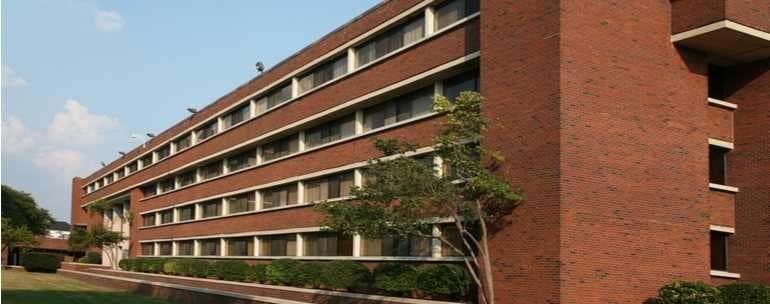
Founded in 1956, the University of Michigan – Flint is one of the regional campuses of the University of Michigan. This public university has diverse learners and scholars that are committed to advancing their local and global communities.
At this institution, they value excellence in learning, teaching, and scholarship, as well as student-centeredness and engaged citizenship. In their publication “Best Regional Colleges,” the Princeton Review included the University of Michigan – Flint in the “Best Midwestern” category. Moreover, they had also included this university as one of the Best Business Schools in their publications.
- BS in Substance Use Treatment and Intervention
The University of Michigan-Flint is accredited by the Higher Learning Commission.
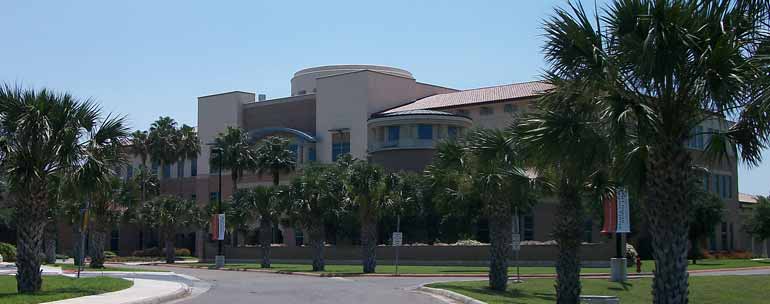
The University of Texas Rio Grande Valley (UTRGV) is a public research university with multiple campuses in the Rio Grande Valley region of Texas. It is part of the University Texas System.
This institution was founded very recently, in 2013. It entered into full operation in 2015 after the consolidation of the University of Texas at Brownsville/Texas Southmost College, the University of Texas-Pan American, and the UT Regional Academic Health Center-Harlingen. The University has a new medical school.
- Bachelor’s in Addiction Studies
The University of Texas Rio Grande Valley (UTRGV) is accredited by the Southern Association of Colleges and Schools Commission on Colleges.
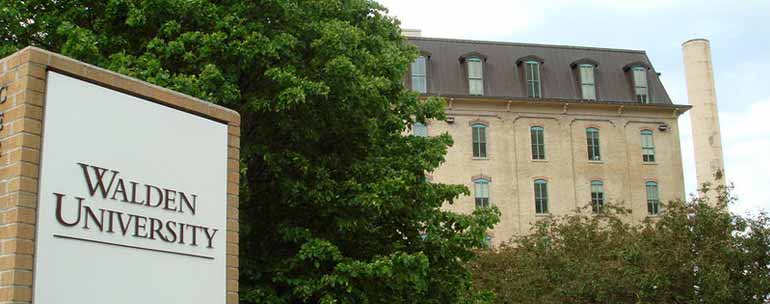
Walden University is an online university and public benefit corporation headquartered in Minneapolis, Minnesota. It was first established in 1970. With many degree offerings, Walden is part of a global network of universities managed by Laureate Education Inc. The university’s academic offices are in Minneapolis, but its administrative office is in Baltimore, Maryland.
- Bachelor’s in Human Services – Addictions
Walden has been accredited by The Higher Learning Commission.
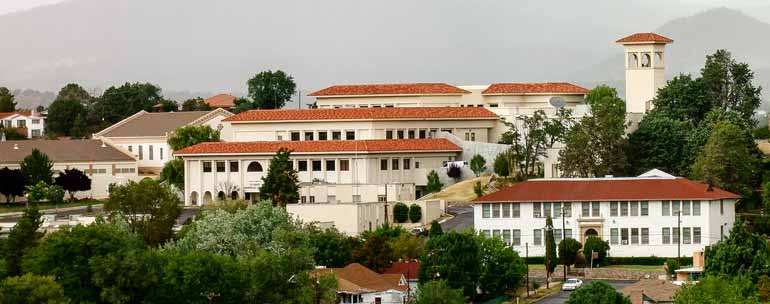
Western New Mexico University is a public university located in Silver City. It has served the people of the state and surrounding area as a comprehensive, regional, rural, public coeducational university since 1893. It caters to a student body diverse in age, culture, language, and ethnic background.
Western New Mexico is a member of the NCAA Division II Lone Star Conference, which they recently joined during the 2016-2017 school year.
- Bachelor’s in Chemical Dependency Counseling
Western New Mexico University is accredited by the Higher Learning Commission of the North Central Association of Colleges and Schools.
Getting Your Bachelor’s in Addiction Counseling Online

Helping people resist and recover from addictions may be a rewarding career. There are a number of online substance abuse counseling schools, so you’ll want to narrow your choices.
Here’s the action plan to get there.
- Determine which area of study you’d like to pursue.
- Apply to the colleges that offer that degree program.
- Research and secure financial aid to propel you through your education.
As you’re studying, keep up your momentum by focusing on your end goal of helping people to live happier, healthier, more productive lives.

